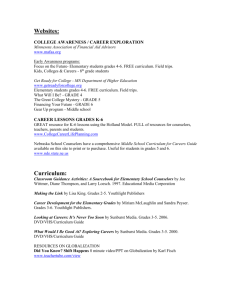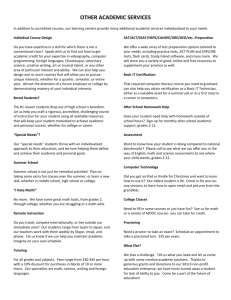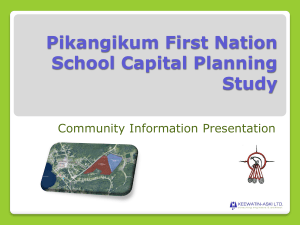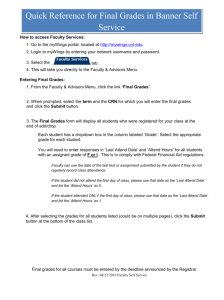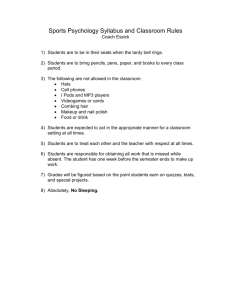Social Emotional Learning - Illinois Service Resource Center
advertisement
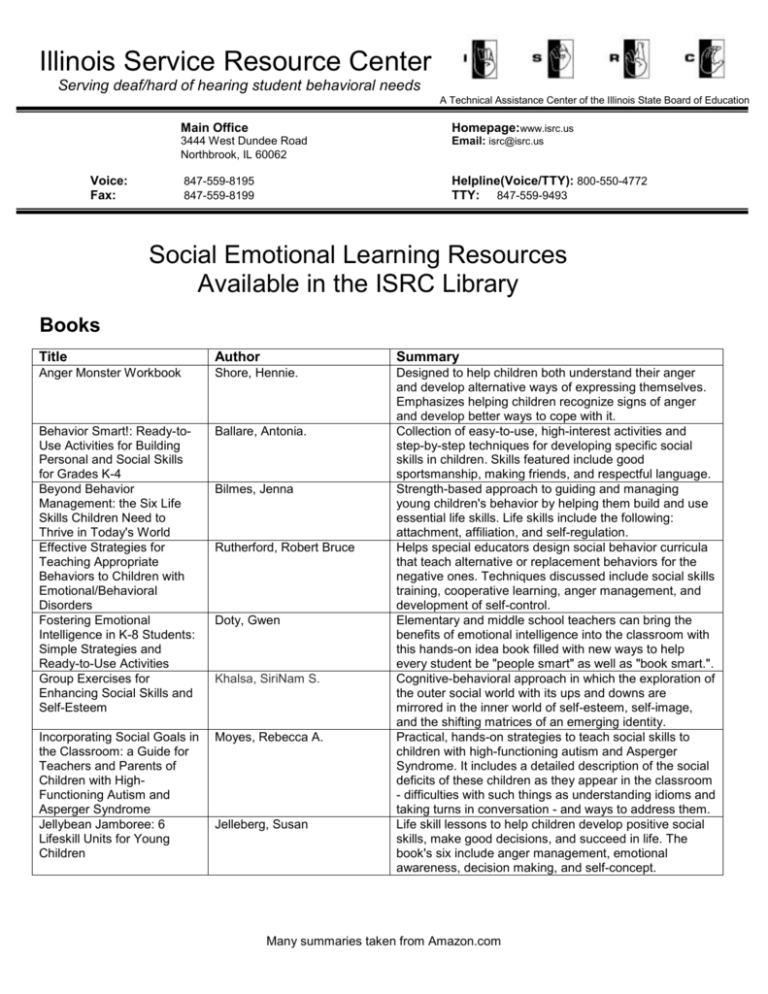
Illinois Service Resource Center Serving deaf/hard of hearing student behavioral needs A Technical Assistance Center of the Illinois State Board of Education Main Office Homepage:www.isrc.us 3444 West Dundee Road Northbrook, IL 60062 Email: isrc@isrc.us 847-559-8195 847-559-8199 Helpline(Voice/TTY): 800-550-4772 TTY: 847-559-9493 Voice: Fax: Social Emotional Learning Resources Available in the ISRC Library Books Title Author Summary Anger Monster Workbook Shore, Hennie. Behavior Smart!: Ready-toUse Activities for Building Personal and Social Skills for Grades K-4 Beyond Behavior Management: the Six Life Skills Children Need to Thrive in Today's World Effective Strategies for Teaching Appropriate Behaviors to Children with Emotional/Behavioral Disorders Fostering Emotional Intelligence in K-8 Students: Simple Strategies and Ready-to-Use Activities Group Exercises for Enhancing Social Skills and Self-Esteem Ballare, Antonia. Incorporating Social Goals in the Classroom: a Guide for Teachers and Parents of Children with HighFunctioning Autism and Asperger Syndrome Jellybean Jamboree: 6 Lifeskill Units for Young Children Moyes, Rebecca A. Designed to help children both understand their anger and develop alternative ways of expressing themselves. Emphasizes helping children recognize signs of anger and develop better ways to cope with it. Collection of easy-to-use, high-interest activities and step-by-step techniques for developing specific social skills in children. Skills featured include good sportsmanship, making friends, and respectful language. Strength-based approach to guiding and managing young children's behavior by helping them build and use essential life skills. Life skills include the following: attachment, affiliation, and self-regulation. Helps special educators design social behavior curricula that teach alternative or replacement behaviors for the negative ones. Techniques discussed include social skills training, cooperative learning, anger management, and development of self-control. Elementary and middle school teachers can bring the benefits of emotional intelligence into the classroom with this hands-on idea book filled with new ways to help every student be "people smart" as well as "book smart.". Cognitive-behavioral approach in which the exploration of the outer social world with its ups and downs are mirrored in the inner world of self-esteem, self-image, and the shifting matrices of an emerging identity. Practical, hands-on strategies to teach social skills to children with high-functioning autism and Asperger Syndrome. It includes a detailed description of the social deficits of these children as they appear in the classroom - difficulties with such things as understanding idioms and taking turns in conversation - and ways to address them. Life skill lessons to help children develop positive social skills, make good decisions, and succeed in life. The book's six include anger management, emotional awareness, decision making, and self-concept. Bilmes, Jenna Rutherford, Robert Bruce Doty, Gwen Khalsa, SiriNam S. Jelleberg, Susan Many summaries taken from Amazon.com Learning Social Skills for Everyday Situations: a Resource for Individuals with Disabilities More Social Skills Stories: Very Personal Picture Stories for Readers and Nonreaders K-12 My Social Stories Book Matthews, Tom. New Social Story Book: Illustrated Edition Gray, Carol Part of the Group: Games that Increase Social Understanding Lou, Mimi WheiPing Promoting Social and Emotional Learning: Guidelines for Educators Elias, Maurice J. Social Skills Activities for Secondary Students with Special Needs Mannix, Darlene Social Skills Activities for Special Children Mannix, Darlene Social Skills Stories: Functional Picture Stories for Readers and Nonreaders, K-12 SOS Help for Emotions: Managing Anxiety, Anger, and Depression Johnson, Anne Marie That's Life!: Social Language McConnell, Nancy That's Life! Life Skills Smith, Patricia Treating Youth with DSM-IV Disorders: the Role of Social Skill Instruction Sterba, Michael Johnson, Anne Marie. Gray, Carol Clark, Lynn Worksheets and activities in this book help individuals with disabilities function more effectively in everyday situations. Topics include Going to the store, using a laundromat, and talking on the telephone. Social skills stories that depict the appropriate or inappropriate use of communication and socialinteraction skills including morning grooming checklist, properly fitting clothing, sneezing, and nose picking. Contains almost 200 stories, arranged in sets that take children step-by-step through basic activities such as brushing your teeth, taking a bath and wearing a safety belt in the car. Social Stories help the child with autism or Asperger's Syndrome to understand the social world around them. This book is an updated version of the New Social Story Book with new text and accompanying illustrations. Contains over 35 games and activities designed for deaf individuals of all ages. These games work on different areas of social knowledge such as perspective-taking, social problem solving, and communication. Provides principles for meeting the challenge of fostering knowledgeable, responsible, and caring students in a straightforward, practical guide to establishing highquality social and emotional education programs. Collection of 200 ready-to-use worksheets to help adolescents build the social skills they need to interact effectively with others and learn how to apply these skills to various real-life settings, situations, and problems. Provides ready-to-use lessons--complete with reproducible worksheets--to help children become aware of acceptable social behavior and develop proficiency in acquiring basic social skills. Social skill stories that depict the appropriate or inappropriate use of communication and social interaction skills including greetings, interrupting, appropriate conversational topics, and proxemics. Self-help book and program that is easy to read and to follow. By understanding and applying this program, people learn useful self-help methods from cognitive behavior therapy. Teaches students how to be effective, appropriate communicators in a wide variety of situation. Through direct instruction, role-playing, observation, and discussion, students will learn how and why specific social language guidelines can improve interpersonal relationships in all aspects of life. Prepare your students with special needs for independence with practical activities that target essential vocabulary, language, thinking, following directions, interpretation, and decision making skills. Unites the American Psychiatric Association's most widely used evaluation tool with Boys Town's proven social skills teaching philosophy. As a result, professional caregivers are shown how to expand their treatment options, enhance treatment progress, and enable youth to overcome their problems. Many summaries taken from Amazon.com Very Angry Day that Amy Didn't Have Shapiro, Lawrence E. Vocational and Transition Services for Adolescents with Emotional and Behavioral Disorders: Strategies and Best Practices Well-Managed Classroom: Strategies to create a Productive and Cooperative Social Climate in your Learning Community (none) Hensley, Michele. Margaret and Amy are two girls in the same class who are coincidentally both having a very difficult day. While Amy finds ways to solve the various problems she encounters, Margaret makes things worse by her reactions. This simple book is an excellent tool to help young children learn alternatives to getting angry. Presents a comprehensive blueprint for establishing and conducting a successful community-based vocational and transition program. The approach focuses on areas crucial for helping adolescents make a successful transition to adult life. The authors provide numerous case examples and program guidelines. Shows teachers how to overhaul or enhance the social climate and build a true community in their classroom and/or school. Describes the Girls and Boys Town Education Model, a school-based intervention strategy that emphasizes behavior management practices, relationship-building techniques, and social skills instruction. Book Sets and Curriculum Kits Title Grade Level Range(s) Contents Summary 101 Ways to Teach Children Social Skills: a Ready-to-Use, Reproducible Activity Book Not specified 1 book 1 CD-ROM Attainment's Social Story Readers Stories written at 2nd grade reading level 1 student book 1 instructor’s guide 1 CD-ROM Autism and PDD: Social Skills Lessons Primary Intermediate Adolescent Primary – 2 books Intermediate – 5 books Adolescent – 3 books Connecting with Others: Lessons for Teaching Social and Emotional Competence Grades K-2 Grades 3-5 Grades 6-8 Grades 9-12 1 book for each grade level range Includes 101 ready-to-use, reproducible activities to help children improve their social skills. Topics include communicating, expressing feelings, and caring for self and others. Presents 16 engaging, full-color stories, written at a second grade reading level and illustrated in a graphic novel style. Topics include: Taking responsibility and handling routine disruptions. Topics covered in primary set include behavior, and school Topics covered in intermediate set include healthy habits, middle school, communication, controlling behavior, and special events and activities Topics covered in adolescent set include managing behavior, health and hygiene, and interacting Helps students learn to be sensitive to differences, resolve conflicts without resorting to violence, and learn tolerance and acceptance of others. Includes 30 lessons divided into skill areas such as concept of self and others, socialization, problem solving and conflict resolution, and communication Many summaries taken from Amazon.com Getting Along with Others: Teaching Social Effectiveness to Children Elementary 1 program guide 1 set of skills lessons and activities Girls in Real Life Situations: Group Counseling Activities for Enhancing Social and Emotional Development Grades K-5 Grades 6-12 1 book for each grade level range Learn About Life: Sexuality & Social Skills Adolescent and older 6 picture booklets 1 instructor’s guide Cover up stickers Lessons for Life: How Smart Schools Boost Academic, Social, and Emotional Intelligence Not specified 3 VHS 1 booklet PATHS curriculum Grades K-6 Promoting Social Success: a Curriculum for Children with Special Needs Elementary 7 manuals Turtle puppet Turtle stamp Feeling face cards Display charts Posters Feeling photographs 1 book Ready-to-Use Social Skills Lessons & Activities PreK-K Grades 1-3 Grades 4-6 Grades 7-12 1 book for each grade level range Many summaries taken from Amazon.com Program that combines direct intervention with systemic instructional techniques. Includes lessons that teach 17 core social skills including introducing self and following directions. Group counseling curriculum provides over 80 activities divided into ten session themes. During group lessons, girls are encouraged to share feelings and struggles as they openly discuss important issues in a safe and supportive environment. Illustrated sexual education and social skills program with straightforward, candid graphics and simple text. Effective for students who don't understand euphemisms or veiled explanations, but need to know what's going on with their bodies, what is appropriate and how to stay safe. Provides specific strategies and applications of SEL principles that will help educators and others to: create safe learning environments, help students and staff identify, manage, and act constructively to destructive behavior, engage students in solving problems, resolving conflicts, and setting positive goals, and ensure that students are engaged and motivated Curriculum program for elementary school classroom use in promoting self-control, positive self-esteem, emotional awareness and interpersonal problem solving skills. Contents include feelings and relationships, problem-solving, readiness and self-control, and teaching PATHS in your classroom. Focuses on helping children learn the cognitive skills behind appropriate social behavior rather than teaching them a set of specific behaviors to enact. Helps classroom teachers and specialists teach appropriate behavioral skills to students. Activities emphasize teaching youth to recognize the equal rights of others, and develop their skills in using good judgment to resolve conflicts. Second Step: a ViolencePrevention Curriculum. Grade 3 Grade 4 Grade 5 Grades 6-8 1 VHS & 1 teacher’s guide for each grade level/grade level range Skillstreaming: Teaching Prosocial Skills Early Childhood Elementary School Adolescent Social Skills in Pictures, Stories, and Songs: a Multisensory Program Preschool Early Elementary Early childhood1 book, 1 set of program forms Elementary school - 1 book, 1 student manual, 1 set of program forms, 1 box of 480 skill cards. Adolescent – 1 book 1 book 1 CD Social Success Workbook Adolescent and older 1 book 1 CD-ROM Stop & Think Social Skills Program PreK-1st grade Grades 2-3 Grades 4-5 Grades 6-8 Thinking, Feeling, Behaving: an Emotional Education curriculum for adolescents Grades 7-12 PreK-1st grade – Teacher’s manual Grades 2-3 – 1 book, set of reproducible forms, 6 posters, 5 sets of cue cards, set of stop & think cards. Grades 4-5 – Teacher’s manual Grades 6-8 – Teacher’s manual 1 Book Many summaries taken from Amazon.com Integrates social and emotional learning with academics. Kids from preschool through Grade 8 learn and practice vital social skills, such as empathy, emotion management, problem solving, and cooperation. Shows how to teach 60 prosocial skills such as asking for help, saying thank you, accepting consequences, using self-control, and dealing with group pressure. Skill areas are divided into five groups: Classroom Survival Skills, Friendship-Making Skills, Dealing with Feelings, alternatives to Aggression, and Dealing with Stress. Research-based curriculum built around four original stories and songs featuring animal characters. Stories include “Rosie the Roadrunner Learns to Follow Directions” and “Prairie Dog Pete Learns to Share.” Includes forty activities teens with Asperger's disorder, nonverbal learning disorder (NLD), or other problems relating to others can do to recognize and use their unique strengths, understand the unspoken rules behind how people relate to each other, and improve their social skills. Helps students learn interpersonal, survival, problem-solving, and conflict resolution skills that are critical to their success in school and in the real world. Essential resource for helping students learn to overcome irrational beliefs, negative feelings, and the negative consequences that may result. Packed with 105 creative and easy-to-do activities 15 are new to this edition. Walker Social Skills Curriculum: the ACCEPTS Program Adolescent (Middle and High School) 1 book 1 student study guide 1 VHS Why try?: Motivating Students with Challenges Not specified 1 manual 1 CD 10 student handouts Based on principles of direct instruction and relies on competency based and problem solving approaches. Teaches mastery of social skills in three areas: peerrelated social skills, adult-related social skills, and self-related social skills. Teaches youth 10 visual analogies to help them deal with life’s daily pressures and challenges. Goal is to help youth answer the question “Why try in life?” when they are frustrated, confused, or angry. Audiovisual Materials Title Format Summary Anger: Ten Skills to Control Anger VHS Social Skills: a Social Skills Training Program VHS Contents include knowing when others are being aggressive, knowing feelings related to anger, knowing how the victim feels, knowing how others view aggression, and talking to yourself to control anger. Includes VideoSkits to teach students12 social skills such as introducing yourself, starting a conversation, giving a compliment, and following rules. Many summaries taken from Amazon.com


